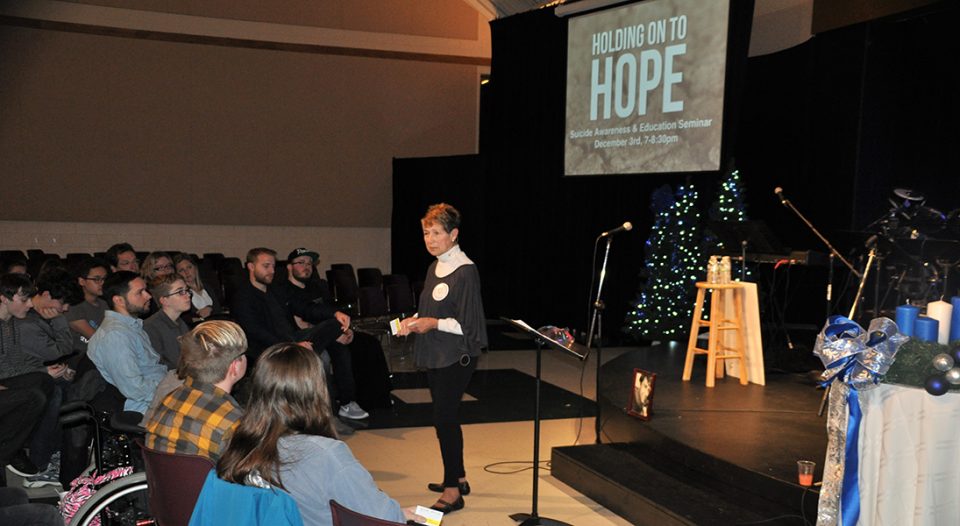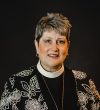Editor’s note: In recognition of National Suicide Prevention Week (Sept. 10-16), Suicide Prevention Services co-founder Sherry Bryant spoke with Living Lutheran about how her son’s death put her on a path to becoming an advocate for mental health awareness and suicide prevention, about the changes she’s seen in awareness since then and about the ways people continue to struggle with talking about suicide.
When Sherry Bryant’s 22-year-old son Todd died by suicide in 1993, she felt her congregation at the time wasn’t a safe place to talk about her loss and grief, largely because of old belief systems—especially within the church—about the “sin” and stigma of suicide.
Bryant and her husband, both mental health professionals, found help in a community support group that accompanied them through the days, weeks and years after their son’s death.
A member of Our Saviour Lutheran Church in Naperville, Ill., Bryant said that when her son died, she met another woman in her community who was a pioneer in suicide prevention and mental health.
“There were no magic words, just ordinary people being with ordinary people.”
“She had lost her mother in 1979, and she was responsible for putting together the Midwest crisis line—that was the first crisis line in Illinois,” Bryant said. “She put together a ‘survivors of suicide’ group. We looked at each other and said, ‘What are we doing just helping people grieving? We need to work to stop suicide.’ That was a desert of a place. There wasn’t a lot that talked about suicide. There was nothing that talked about suicide prevention.”
Today a three-digit national suicide crisis line, 988, connects people experiencing suicidal crisis or mental-health-related distress with the care and support they need. The National Suicide Hotline Designation Act was signed into law in 2020, and as of 2022, all phone companies and text-messaging providers were required to route all calls and text messages to 988 to the 988 Suicide & Crisis Lifeline.
Bryant, who was doing social work in schools at the time of her son’s death, said that when she later retired, she decided to spend most of her volunteer time working with suicide and mental health agencies. That work includes bringing workshops to congregations, especially for parents and teenagers.
“We can’t be freaked out about tough things”
Bryant wants communities of faith to learn about how to talk about suicide and mental health. She believes that, for too long, those communities have viewed such discussions as “scary and dangerous.” She said research has changed what she was taught in graduate school in the 1980s.
“What research tells us in the last 30 years [is that] when people at risk can talk, they feel listened to,” she said. “Ordinary people need to be trained to talk about suicide or mental health, to reach out to each other. Those kinds of ideas about how to ask someone if they’re depressed and to use the right words—depression, anxiety—to ask people openly how they’re feeling. And if they don’t want to answer, that’s OK, but be open to reaching out and saying those kinds of words.”
She said the ELCA’s social messages about suicide and mental health should guide churches in talking about these issues.
The ELCA social message on suicide prevention, adopted by the Church Council in 1999 and updated in 2021 with new statistics and resource information, includes both a theological understanding of suicide and practical resources for congregations, rostered ministers and other leaders.
“There is so much need for people to be listened to. It’s the thing that’s made a difference.”
The message emphasizes that life is a precious gift from God and the churchwide organization explains suicide as the “tragic brokenness of living that some experience as a torment without hope.” It reminds church members to share life’s burdens, especially when it might be easier to not engage with someone who lives in despair.
“We have to not be freaked out about tough things,” Bryant said. “If the churches don’t talk about it, we appear to be scared about these issues. We need to listen to people who are hurting.”
Bryant said that when her son died, the person who walked with her family most faithfully was a lay congregation member—a Stephen Ministries volunteer. Other congregation members had trouble talking about the suicide, but “our Stephen minister, she followed us through the years. There were no magic words, just ordinary people being with ordinary people.”
The local and regional organizations constituting the 988 Suicide & Crisis Lifeline are staffed by such ordinary people, and they’re having an impact, Bryant said, adding, “The volunteers have a stake. They’ve lost someone or have had their own mental health issues. There is so much need for people to be listened to. It’s the thing that’s made a difference.”
To get help or learn more:
- Find Suicide Prevention Ministry resources and training for faith communities at suicidepreventionministry.org.
- Read the ELCA social messages on suicide prevention and mental illness.






